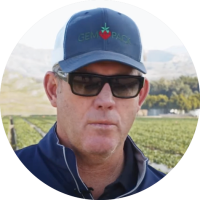As we’ve gone on this journey, we’ve come to an important realization: the only way to feed the world in a healthy way without destroying the environment is an agricultural system free from chemicals. But is something like this even possible with a population of 7.8 – soon to be 9 billion people? The answer is yes! At Earthmade, our scientists are working with nature instead of against it. We are harnessing a technology that has already existed for millions of years, under our feet!
Earthmade uses a new beneficial fungi and bacteria technology to combat pests and heal the compromised soil our crops rely on. We’ve been blown away by the efficacy as we watch these natural organisms outperform the harmful chemicals we’ve relied on for years. Once considered a scientific impossibility, it’s now a reality. The same fields we’ve farmed for years are growing healthier each season without the use of any chemicals.
Not only are our crops healthier, but the pests are disappearing and the biodiversity is improving. The bees are finally coming back to the fields. The ecosystem is again in balance. And by improving the health of the soils, we’re infusing our food with the essential minerals and microbiology essential for our health.
But what does all this mean for the consumer? Even if we know something has been produced free from chemical inputs, how do we know if it was grown in a way that produces the essential nutrients our bodies need? For anyone who hasn’t been fully sold on the need to remove chemical inputs and grow more nutritious food, there is another benefit to help seal the deal: taste. Earthmade food actually tastes the way nature intended. It not only tastes much better, it’s much better for you, and free of the toxic residues that have been disrupting the intricate ecosystems within us for decades.
All of this is to say that true change will only occur when we embrace solutions that address the root causes of our problems. To fix our health crisis, we need to realize that we’re connected to the dirt. We need to address the health of our soils and the plants and animals that rely on them. In other words, we need to look at our health from the ground up.











